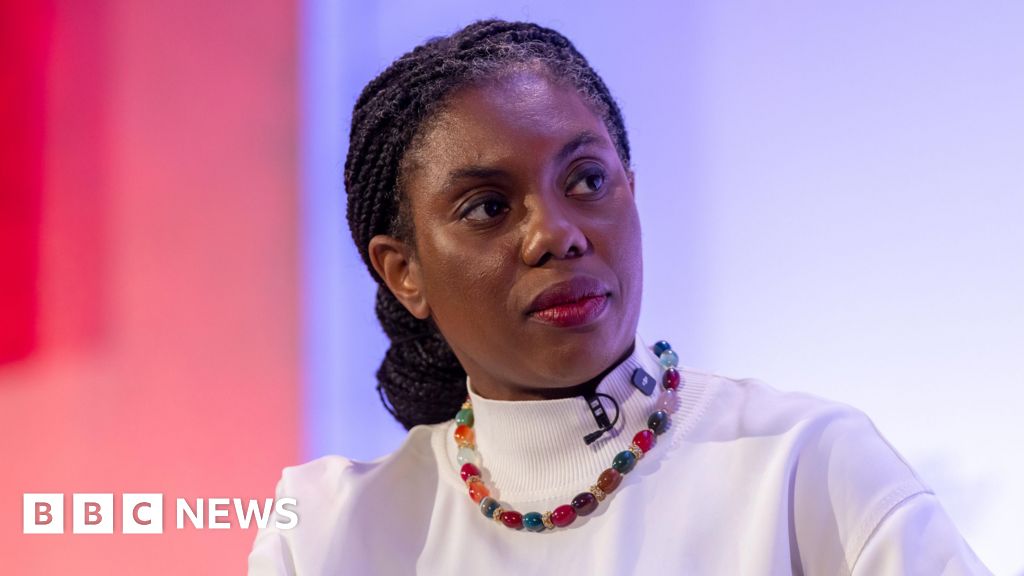I no longer identify as Nigerian, UK opposition leader says

Kemi Badenoch: UK Minister Says She No Longer Identifies as Nigerian
Kemi Badenoch, a prominent figure in the UK's Conservative Party, has stated that she no longer identifies as Nigerian, a departure from her heritage that has sparked debate and drawn attention to complex issues of identity and belonging. Badenoch, who holds a senior ministerial position within the British government, revealed she has not renewed her Nigerian passport since the early 2000s.
The declaration, made during an interview on Gyles Brandreth's "Rosebud" podcast, has reignited discussions about dual nationality, cultural identity, and the evolving relationship between individuals and their countries of origin, particularly within the African diaspora.
From Lagos to London: A Journey of Identity
Born in the UK, Badenoch spent her formative years in both Nigeria and the United States before returning to England at the age of 16. She attributed her return to the UK to Nigeria's "worsening political and economic climate" at the time, as well as a desire to pursue further education.
"I'm Nigerian through ancestry, by birth… but by identity, I'm not really," Badenoch explained on the podcast. She emphasized that while she has strong family ties to Nigeria and remains interested in its affairs, her primary sense of belonging lies in the UK, where she has built her life and political career.
Badenoch recounted an experience where she needed a visa to visit Nigeria following her father's death, describing the process as "a big fandango." This experience seemed to underscore her detachment from the practical aspects of Nigerian citizenship.
Criticism and Defence
Badenoch's comments have not been without controversy. Last year, she faced criticism from Nigeria's Vice-President Kashim Shettima, who accused her of "denigrating" her country of origin after she spoke of growing up in fear and insecurity in Nigeria due to corruption. A spokesperson for Badenoch strongly refuted those claims.
Her perspective has also prompted wider discussion about the experiences of individuals who navigate multiple cultural identities. Some view her decision as a personal choice reflecting her lived experience, while others see it as a rejection of her heritage.
Expert Perspectives
Dr. Adia Ukpabi, a lecturer in African Diaspora Studies at the University of London, commented on the complexities of identity formation. "Identity is not static; it's a fluid and evolving process shaped by individual experiences, social contexts, and personal choices," she explained. "For individuals like Ms. Badenoch, who have lived in multiple countries and cultures, the sense of belonging can be particularly nuanced. Her statements reflect a personal journey, and it's important to understand the factors that have contributed to her evolving sense of self."
Political analyst, Babatunde Oluwole, based in Lagos, suggests Badenoch's statements could be interpreted through a political lens. "In the context of British politics, where questions of immigration and national identity are frequently debated, Ms. Badenoch's comments could be seen as an attempt to solidify her position within the Conservative Party and appeal to certain segments of the electorate," Oluwole stated. "However, they also risk alienating members of the Nigerian diaspora who may feel that she is disavowing her roots."
Historical and Current Context
The relationship between Nigeria and its diaspora is complex. Historically, many Nigerians have sought opportunities abroad, particularly in the UK, due to economic challenges, political instability, and the pursuit of higher education. These individuals often maintain strong ties to their homeland, contributing remittances and engaging in philanthropic activities.
However, issues of dual citizenship, cultural assimilation, and the perception of Nigeria on the global stage remain sensitive topics. The Nigerian government has actively sought to engage with its diaspora, recognizing their potential to contribute to the country's development. However, instances of perceived criticism from diaspora members, such as Badenoch's past comments, can strain these relationships.
Badenoch's Political Outlook
Badenoch has stated that her early experiences in Nigeria have shaped her political outlook, including her aversion to socialism. She recalled feeling like she didn't belong in Nigeria as a child, and remembers returning to the UK in 1996 and feeling "this is home."
She also stated she had not experienced racial prejudice in the UK "in any meaningful form," adding that she defends the UK whenever there are accusations of racism because people "didn't treat me differently."
Her political career has seen her rise through the ranks of the Conservative Party, holding various ministerial positions. Her views on economic policy, social issues, and international relations often reflect a conservative stance.
The debate surrounding Badenoch's identity highlights the complexities of belonging in a globalized world and the diverse ways in which individuals negotiate their cultural heritage and national affiliations.
Originally sourced from: BBC News Africa
